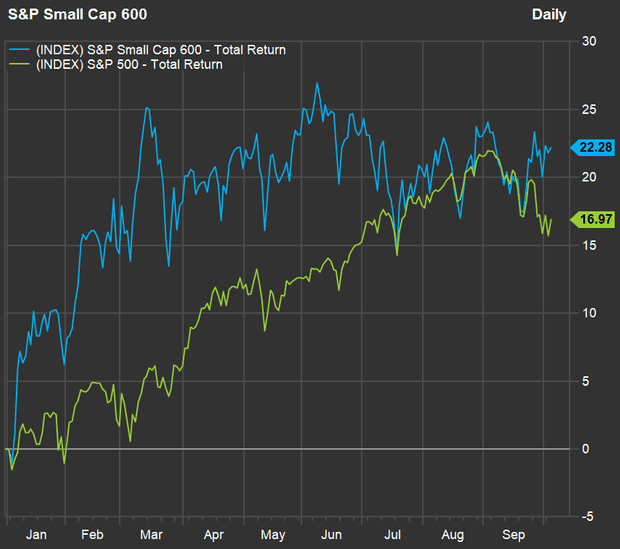Finding great stocks is easy; finding untapped revenue-rocketing stocks is life-changing. Just ask the early Apple, Tesla, and Dell investors. These blue-chip stocks, or small-cap equities, offer the reward of uncapped potential to early investors, and while the returns can be incredible, timing is critical.
Small-cap equities have been on a rollercoaster ride since the onset of the pandemic. Then, just when the tide seemed to be taking a downturn late this summer officially, small caps went back on the upswing. Now, with investor sentiment rebounding, small caps are leading the market and drawing intrigue.
So what’s the real story with small-cap equities? Good idea or bad? Predictable or not? The answer — like just about every other stock market scenario — it depends. Investors seem particularly bullish about high-potential small caps as an opportunity to generate significant returns down the line, and we can see why. There are currently 1,684 companies valued between $300 million and $2 billion. That’s plenty of pickings!
So how do you win in the small-cap space? Let’s look at the small-cap journey of the past 18 months and four things to keep in mind if you’re thinking about small-cap equity investing.
Small-cap Equities in the Pandemic Market
Growth was the name of the game for small-cap equities in 2020. They started the year like any other (didn’t we all) with an underperforming but not unexpected first quarter. Fast forward to November, and they were outperforming all major indexes and predicted to continue doing so throughout the year.
Small caps persevered and outperformed despite concerns that smaller companies would struggle more from pandemic-related market impacts than larger counterparts (who benefited more from government stimulus measures and cheap debt). As a result, November 2020 was one of the best months ever recorded for small-cap equities.
Conservative Small-cap Outlook is Short-Lived
Growth for small caps did not slow down in the first quarter, peaking in March before finally leveling off. However, market chatter indicated investors were easing off small-cap bets in anticipation of an economic slowdown as government stimulus measures waned concurrently with the rise of the Delta variant and its potential economic impacts.
While it’s true that their explosive growth has slowed, small-cap equities have remained competitive. Recently, the S&P SmallCap 600 has still outperformed the S&P 500 for the year and looks strong.
Investors, too, are acknowledging their resilience and high potential, changing their tune in many cases about taking a conservative approach to small-cap equities.
Winning with Small-cap Equities
So what is keeping small caps going strong? If it’s true that they’re so susceptible to economic downturns and volatility, shouldn’t they be struggling more amidst the Delta variant spread and an anticipated rise in federal interest rates?
The truth is that small caps are a nuanced bet. ETFs certainly simplify the small-cap investment process and build in protection, but if you ask experts in the space, they’ll tell you that the real opportunity is an active, engaged stock selection.
Investors who can find resilient small-cap stocks not dependent on a single economic factor and likely to grow in the long-term can yield significant returns. It sounds a bit like looking for a needle in a haystack, right? In a way, yes. High-potential small-cap alpha opportunities aren’t floating at the surface to be picked up by any passing investment ship.
You have to know where to look and understand how to find the right small-cap equities. Here’s what to keep in mind.
Active Selection is Key
Small-cap enthusiasts often cite the idea of active selection as the key to success with small-cap equities. But, unfortunately, small caps are frequently overlooked by the market. The idea is that investors willing to do the research and find “hidden-gem companies” can capitalize on undervaluation to generate significant returns.
Of course, that process is not as easy as it may sound. Active selection requires knowledge and human resources to conduct the proper research and analysis (and the budget that comes along with them). Many investors end up not beating market indexes because of expenses they incurred during the research process. To see ongoing small-cap success, small-cap selection, and investment needs to be scaled up until returns begin to outweigh what you’re spending to achieve them.
Look for Innovation
If there’s that much risk involved, why are companies seeking to do the work required to find small-cap opportunities? One reason is that some of the highest levels of innovation and potential life in the small-cap sector with startups and high-growth new companies. Amazon and Tesla, for example, started as small-cap stocks earlier in the 2000s. It’s a game, not every investor wants to play, because, of course, most stocks won’t turn out to be the next Amazon or Tesla. But it is interesting, and if you’ve got a knack for finding innovative companies with business models likely to see considerable growth soon, you can score big with small-cap equity investing.
Leverage Small-cap Equities for Diversification
Not every investor wants to put all or most of their eggs in a small-cap equity basket. That said, small-caps can provide excellent diversification for a more traditional portfolio. This is where small-cap ETFs find popularity by presenting a best-of-both-worlds type scenario, diversifying your portfolio without the risk associated with selecting and investing big in individual stocks.
Takeaways
Active selection and quality research are critical components of a successful small-cap strategy. Many investors are drawn to small caps because high levels of innovation live in startups and growing new companies. In addition, small-cap equities are an attractive option for portfolio diversification, particularly in the form of less risky ETFs.
Access Timely Stock Market Insights on AlphaSense
On the AlphaSense platform, you’ll gain access to 10,000+ premium business data sources, including broker research, transcripts, SEC filings, news & trade journals. Never miss another opportunity. Start your free trial today.





